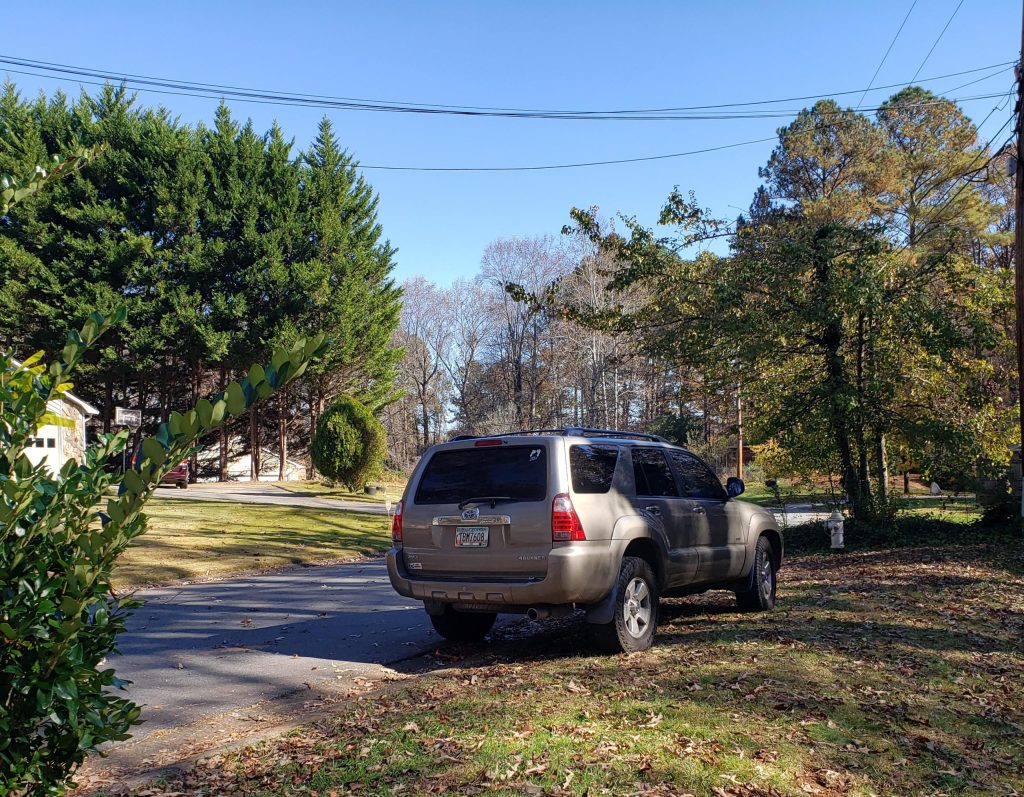Like many municipalities, Brick Township’s code prohibits residents from parking vehicles on their front lawns unless they obtain a permit to designate an area for parking. The ordinance is rarely questioned, and enforced based on complaints rather than patrols by code enforcement officers, but the recent recipient of a ticket for the offense asked township officials at a recent meeting why the ordinance exists.
As for the law itself, the township code in Brick is clear on the issue, codified in Section 267-8. The code book states: “It shall be unlawful for any residential property owner to park or permit the parking of any vehicle on his or her residential lawn.”
The issue was brought up at a council meeting after a resident of Greenwood Lane (whose name we are withholding as a courtesy) rose to speak about a summons he was issued for violating the ordinance. The man said he parks on his front lawn because he feels the street is too narrow, and too busy, to safely park on the pavement.
|
|
“It’s used as a cut-through right off Mantoloking Road, and there is constant traffic,” he said. “I have so many problems with that road – I’ve been a resident there for about five years now and everyone has the same problem. Everyone flies down that road.”
As for the parking ordinance: “I never even knew that was a thing, and in my opinion it’s a silly thing,” he added.
Why Does the Ordinance Exist?
There are legal reasons – as well as practical reasons – why such ordinances exist, and news articles from across the country chronicle more and more cities adopting them. Recently, Aurora, Colorado residents debated a ban on front lawn parking, with a council member stating that the presence of vehicles parked on lawns has led to a “detraction to the overall value of people’s property.”
In Cape Coral, Florida, the issue came to a head in 2019, when the city adopted regulations banning parking on lawns there, citing the fact that many residents consider cars parked on front lawns to be an “eyesore.”
Officials in Corpus Christi, Texas passed a similar law in 2021, largely because of an outcry over parked vehicles deteriorating on lawns and reducing the curb appeal of the neighborhood. There, however, the ordinance allows front lawn parking on certain streets that are determined to be particularly narrow. The Corpus Christi ordinance sets fines for violators at $500, well above those that are issued in Brick.
New Jersey, Township Administrator Joanne Bergin explained, adopts a uniform property maintenance code in its land use statutes, a version of which is then expected to be adopted by each town.
“It is part of the international property maintenance code adopted by the state of New Jersey that each municipality adopts as its own,” she said.
Brick’s parking regulations are tame compared to many cities in New Jersey, where parking is outright banned overnight without notifying police and obtaining permission. Locally, Spring Lake vigorously enforces such an ordinance, and North Jersey towns routinely prohibit on-street parking overnight. Brick does not send out police or code enforcement officers to proactively enforce the ordinance, however.
“We don’t go around looking for these things, they generally come as a result of a complaint,” Bergin said, explaining that while some residents may not believe lawnside parking is a big deal, many residents disagree.
Alternatives?
Brick Township’s code is interpreted to mean that parking is prohibited when all four of a vehicle’s tires are on the lawn surface. If two tires are parked on the pavement, the other two may be parked on a lawn. That alternative did not pass muster with the resident.
“If anybody were to park their vehicle halfway, with two tires touching the pavement, and someone is parked on the other side … there is no possible way for somebody to get down such a busy street,” he said.
Yet another answer for some residents may be to approach the township and apply for relief from the ordinance if necessary.
“There is an alternative where you can submit an engineering permit to make a portion of your lawn an official driveway, and then you can park there,” said Bergin.
As for the issue of roads like Greenwood Lane being used as a cut-through for drivers to avoid a more congested, major roadway, there simply is no state law that makes short-cuts illegal.
“It’s a public street, so even if it’s bothersome, people are allowed to cut through,” said Bergin. “It is a public street, and the public is allowed to use it to get from point ‘a’ to point ‘b.’”












